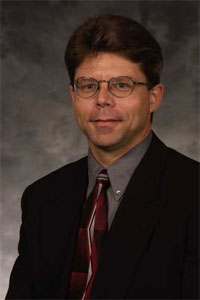 Jeff Russell has seen what philanthropy can do on campus, and that’s a big reason he and his wife, Vicki, support the UW-Madison.
Jeff Russell has seen what philanthropy can do on campus, and that’s a big reason he and his wife, Vicki, support the UW-Madison.
Russell is vice provost for lifelong learning and dean of the UW-Madison Division of Continuing Studies. Previously, he was professor and chair of the Department of Civil and Environmental Engineering and a co-founder of the Construction Engineering and Management program.
He and Vicki have supported, among other efforts, initiatives in his former department, the Great People Scholarship Campaign and student engineering competitions. They also have included the university in their estate plans.
What motivates your giving?
It was something that Vicki and I thought we should do consistently to give something back. That’s the impetus. I was influenced by others I have worked with, people like Oscar Boldt, Alice Mortensen, John Nelson, Raj Sheth, Ted Richards and other folks. Working with a lot of our great graduates has been influential, watching the way they manage their assets to help others instead of just taking care of themselves.
When you were heading Civil and Environmental Engineering, the department established a Great People Scholarship. Why was that important?
That was a significant effort in our department. A lot of the staff and faculty made gifts. I get letters from the scholarship recipients, and I have to tell you, they are extremely moving. You read the stories of these young people – they’re here, they’re doing great things, like all of our young people are – but their stories are what really make it interesting.
Everybody, as little or large as a gift is perceived to be, can help make a difference. That’s what I’ve seen around campus. Giving has been significant. There are some people who can do very meaningful things immediately, and there are others who are working in tandem with many other people. Collectively, you put that together and they have an impact.
Why did an estate gift make sense for you?
You can look long-term and think about structuring something now. I mean, who knows what’s going to happen in 30 years? Some of these vehicles are available that can help you do something bigger than you can with a direct gift at the time. The chances of me being able to give a $2.5 million gift are fairly slim. But through a vehicle like an estate gift, the odds are higher. It’s something to think about.
As someone who has led departments and programs, can you explain what philanthropy means on campus?
Everybody’s aware that to have any kind of flexibility in this kind of environment, where we’re clearly constrained, is just huge. I can remember many cases where people’s annual giving and contributions made the difference in helping a student who had a financial calamity without having to go through a complicated process. Maybe it was something you needed for a student group doing great things, like our ASCE (American Society of Civil Engineers) chapter, which has always been very, very strong. They demonstrated a need, and we had the flexibility to support them. You say, “Do good things, and be good stewards of this.” They knew they were getting this through our alumni and supporters, and your turn’s going to come one day.
We’d deal with the faculty and staff, where they would need help on a particular piece of equipment, maybe supporting a graduate student with a little bit they’d need for a package, recruiting and retaining our key faculty, working with our staff. Without having the help of these discretionary funds, your answer is constantly “no.”
When I was chair of Civil Engineering, my job was in many cases figuring out how to get to “yes,” because people so often heard “no.” From a climate and cultural point of view, that just gets demoralizing. People get frustrated.
In my experience, students asking for help are very reluctant to do that. Most of the faculty and staff make real sincere, substantive requests. It’s never frivolous. They’re fundamental things that are needed. A lot of requests are for core, central-mission items. Having that ability, that extra flexibility, makes a big difference.
How do you see philanthropy’s role on campus moving ahead?
Things have changed a lot. The chancellor has outlined a plan to help us use philanthropy to help us position for future campus success. We need to be thinking about how we can thrive in this new environment of constrained resources. It’s tough. We have to think about innovation and resources we generate from that, and how we transform the ways we deliver education. There’s no doubt philanthropy will mean even more as we go forward and think about doing things differently. It’s an important time for the campus.
